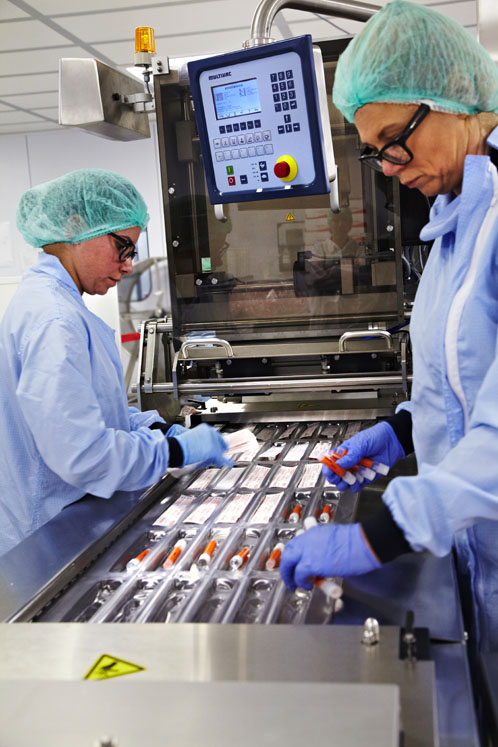Rodney Steel, Chief Executive of the BCMPA — the Association for Contract Manufacturing, Packing, Fulfilment and Logistics — highlights more about the way in which members have been adapting and innovating to serve brands as the industry gets back to business.
During such a “once in a lifetime” event, such as the COVID pandemic, brands and contract manufacturing organisations (CMOs) have learnt a number of vital lessons; for the CMOs, the ability to adapt, adjust and innovate at speed and at scale has seen them respond positively and effectively to the most challenging and unprecedented of times.
For brands and retailers, the realisation of just how crucial and indispensable the professional services of third-party outsourcing businesses are to the production and availability of their products has never been clearer.
A broader service offering
Indeed, many BCMPA members are finding that their clients are relying on them to deliver an even broader service than before, with the aim of establishing a stronger “one-stop shop” ethos in their relationship.
Director of Sales at Wasdell Group, Andy Causer, comments: “We are constantly looking to bring as many processes and production stages in-house as possible to enable us to meet our clients’ requirements for an extended and seamless supply chain and maintain control of entire production cycles."

Rodney Steel
"This has seen Wasdell invest strongly in several areas, including new facilities in Swindon (UK) and Ireland, temperature-controlled transport and enhanced accreditations (such as ISO 13485, HPRA, NRHA, FDA etc.), as well as meeting the requirements of specific sectors such as the Russian market.”
Tammy Williams, Sales Director of Chester Medical, agrees: “Increasingly, clients are seeking a complete solution and we have committed to a significant extension of our capabilities, including additional investment in our carton and leaflet production, increasing our contract packing production suites from 14 to 16, the installation of a new blister line, expanding our controlled drugs storage and introducing more specialist services, such as digital braille printing and serialisation for the EU FMD, US and Russia, including all levels of aggregation.”
Despite the effects of lockdown and restrictions during the past 15 months, continued demand for innovative packaging solutions, heightened serialisation accountability and specific products has meant that additional investment in new production facilities and increased staffing remain on the agenda for many members.
Gareth Lewis, Managing Director at PharmaPac, adds: “This year, as we celebrate our 25th anniversary, we continue to grow — both in terms of investment in new equipment and the services we can offer to our clients. In particular, we have seen demand for serialisation and cold chain supply increase strongly and are investing accordingly.”
Staffing agility
Another consequence of the pandemic has been the need for members to establish and maintain secure, on-site staffing levels at all times … and much work has been undertaken by them to adapt work practices and production lines to ensure uninterrupted service.
This agility has continued to prove beneficial to many CMOs. Williams has seen the positive effects of this, both internally and from a client-facing perspective: “The extraordinary commitment and support of our staff in instigating the changes that we had to introduce to our working protocols to scale-up our operations to meet the needs of our clients has been fantastic. The results of these changes have been appreciated by clients, with one formally recognising the vital collaborative role we played in the delivery of COVID products by scaling our manufacturing capacity to 24 hours.”

Bolstering a robust supply chain
Key amongst the requirements to maintain an effective service for clients during the pandemic has been securing a reliable supply chain for ingredients and raw materials.
Although there have been challenges, thanks to their innately flexible approach to finding solutions, many CMOs have reported a sense that they have come out of the pandemic in a stronger, more resilient position.
Lewis comments: “The combined effect of COVID, Brexit and the recent Suez blockage has caused significant difficulty in maintaining a reliable supply chain, and we have experienced — and are expecting more – price rises. However, our efforts to secure dependable sources of essential supplies have seen us establish an almost exclusively UK-based supply chain, which will stand us in good stead for the future.”
Flexible production to meet increased demand
The predictable rise in demand for certain products in the last 18 months has seen many members commit considerable additional resources to their manufacture and production, raising concerns about the cost of returning these lines to produce the original product.
However, a number of these items seem to be showing signs of remaining in high demand (buffer solution, hand sanitiser, certain pharmaceuticals) even as the industry returns to normality; as such, the need to reallocate production lines may not be as significant as first anticipated, with extra capacity being added instead to allow for growth.
Williams adds: “Although demand for certain products, such as those related to outpatients and clinic medications, saw temporary reductions at the start of COVID owing to hospital appointments being cancelled, the maintenance of demand for other items will likely see an overall increase in the sector, as the whole market returns.”
Developing a closer relationship
A universal constant in discussions with BCMPA members has been the vital importance of meaningful and frequent communication with clients. Causer is confident that effective customer liaison has been critical in both retaining existing clients and winning new ones.
“During the pandemic, we communicated with each client daily, providing them with real-time data and timescales, and seeking updated forward stock requirement plans,” he explains. “This dialogue improved both our ability to satisfy their needs on time, in full, and our broader service relationship with them, an element that has established a stronger connection for future development.”
Looking ahead and building on COVID lessons
Looking to the future for CMOs in the pharmaceutical sector, it seems clear that several factors will be playing a core role in its continued development.
In particular, the almost complete dependence that brands and retailers had on their third-party manufacturing supply chain to deliver during the pandemic, with CMOs stepping up to the challenge almost without fail, has led to a rebalancing of the commercial relationship that bodes well for future negotiations.
In respect of costs, both inflation and logistics-related price rises will have an impact on profitability as markets reawaken, although the new collaborative relationships forged during the last 18 months may facilitate more open discussions with brands and retailers regarding this.
Further work will be required to maintain sustainably robust supply chains for CMOs, and the trend towards being able to offer a wider, more comprehensive service in-house will continue apace.
Capabilities such as cold storage and transportation, more sustainable packaging, serialisation and comprehensive accreditation credentials will soon become more than just desirable, as prospective clients seek effective one-stop shop solutions.
Causer highlighted one of several issues: “With demand growing for the maintenance of products — particularly vaccines — at sub-zero temperatures (sometimes as low as –80 °C), the importance of a capable and comprehensive cold chain offering has become clear, and our on-site pallet cold storage vaults have never been busier.”
The continued prevalence of sustainability issues
Despite the concerted focus on the part of BCMPA members to accommodate this increased demand for additional services, the subject of sustainability and green credentials is still very current … and of increasing importance for many types of packaging.
Members are taking the opportunity to build this consideration into the very early stages of new product lines, finding it easier to achieve sustainability from the “ground up,” instead of the “retro adaptation” of existing lines. Progress is being made in several other areas, including reducing tray weights, sourcing of new more sustainable materials and maximising fill sizes.
In respect of the continued use of plastics, still more work is required to further educate and inform consumers of its true carbon footprint and the fact that the issue is more complex and less clear cut than is being portrayed, especially concerning cross-contaminated materials.
In addition, any possible alternatives must possess the same qualities of effective protection and brand fidelity to be considered a viable alternative and one that can meet pharmaceutical licencing requirements.
However, the introduction of the new Plastic Tax next year is likely to hasten both research into practical alternatives and their introduction, particularly for non-licenced products. The tax will create a renewed drive towards finding truly suitable alternatives, which will need to be driven by brands working with CMOs to overcome the challenges that any new packaging solutions may entail.
In conclusion, there is an air of bullish optimism from BCMPA members as they discover that the hard lessons learned during the pandemic have honed their focus on robust infrastructures, dedication to client services and the importance of agility in a fluid but recovering market.
